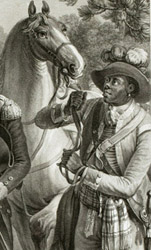James Armistead Lafayette (1748-1830)

James Armistead la Fayette was a patriot spy during the Revolutionary War who, as a double-agent, provided critical information to the Marquis de la Fayette and disinformation to British commander Charles Cornwallis during the months preceding the Yorktown Campaign. James was also a slave who, because of his valuable service, was granted his freedom by the Virginia Assembly in 1787.
James was probably born in 1748 (in 1818, he stated in a pension application that he was 70 years old) in New Kent County, the property of William Armistead. When the War for Independence began, Armistead was appointed one of the managers of Virginia's military supplies, which kept him and, evidence suggests, James in Williamsburg until they moved with the capital to Richmond in 1780. It was in the summer of 1781, during the Marquis de la Fayette's campaign against Cornwallis, that Armistead allowed James to enter la Fayette's service nominally as a servant, but actually as a spy.
By the end of July 1781, James had successfully gained access to Cornwallis' inner circle as a servant to the British commander. He later described in a petition to the Virginia legislature that "he often at the peril of his life found means to frequent the British Camp, by which means he kept open a channel of the useful communications." He used that channel to convey "inclosures from the Marquiss [la Fayette] into the enemies lines, of the most secret & important kind," although, as la Fayette reported to George Washington, Cornwallis "is so shy of his papers that my honest friend says he cannot get at them." Nevertheless, la Fayette informed Washington near the end of August that it was through James that he learned of Cornwallis' move from Portsmouth to Yorktown, the British army's fortification of the town, and the untenable tactical position that would place the British if the French fleet could cut off Cornwallis' escape or reinforcement by sea.
It also appears that James had so effectively ingratiated himself with Cornwallis that the British commander accepted James' offer to act as a spy for the British. James then became a double agent as la Fayette employed him to keep the British troops right where they were by feeding Cornwallis, whose forces outnumbered la Fayette's small army, mostly false information about American troop strength and movement. James' efforts gave the American and French armies and the French navy enough time to reach the Chesapeake and therefore contributed directly to Cornwallis' surrender on October 19.
With the end of the fighting came the end of James' service to la Fayette, so he returned to the life of a slave owned by Armistead. Unfortunately for James, because he was a spy and not an enlisted soldier, the 1782 law passed by the Virginia legislature to provide for the freedom of slaves who had served in the war did not apply to him. la Fayette, however, found a way to show his personal gratitude to James in November 1784 when he gave his "honest friend" a handwritten testimonial:
"This is to certify that the Bearer has done essential services to me while I had the honour to command in this State. His Intelligence from the ennemy's [sic] camp were industriously collected and most faithfully delivered. He perfectly acquitted himself with some important commissions I gave him and appears to me entitled to every reward his situation can admit of."
In November 1786, James, with Armistead's support, used the document to support his petition to the Virginia Assembly "that he may be granted that Freedom, which he flatters himself he has in some degree contributed to establish." The legislature approved the petition and the slave known only as James became James Armistead la Fayette, a free Virginian, on January 9, 1787 (Armistead was compensated £250 as "adequate compensation for the loss of a valuable workman"). James la Fayette went on to become a farmer in New Kent County, owning 40 acres of land next to Armistead's property — and several slaves. In 1818, poor and in failing health, he petitioned the legislature for "a small sum for Emediate relief, and such moderate pension for the remnant of his days as in your wisdom shall seem just." The assembly granted him $60 right away and allowed him a pension of $40 per year thereafter.
When the Marquis de la Fayette visited America in 1824, James "expressed a great desire to see the Marquis at the approaching festival at Yorktown" but required financial assistance "to equip himself for the occasion," according to a Richmond Compiler article that was reprinted in newspapers as far away as Bangor, Maine. One presumes that he received the required aid because the Richmond Enquirer reported that during the event at Yorktown, James "was recognized by [the Marquis] in the crowd, called to him by name, and taken into his embrace." He died six years later, on August 9, 1830, on his New Kent County farm.





